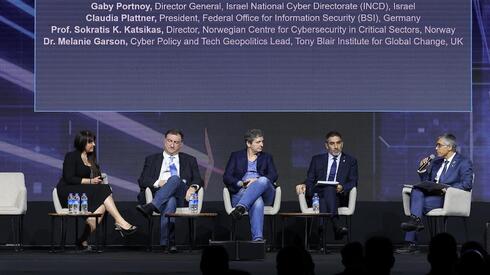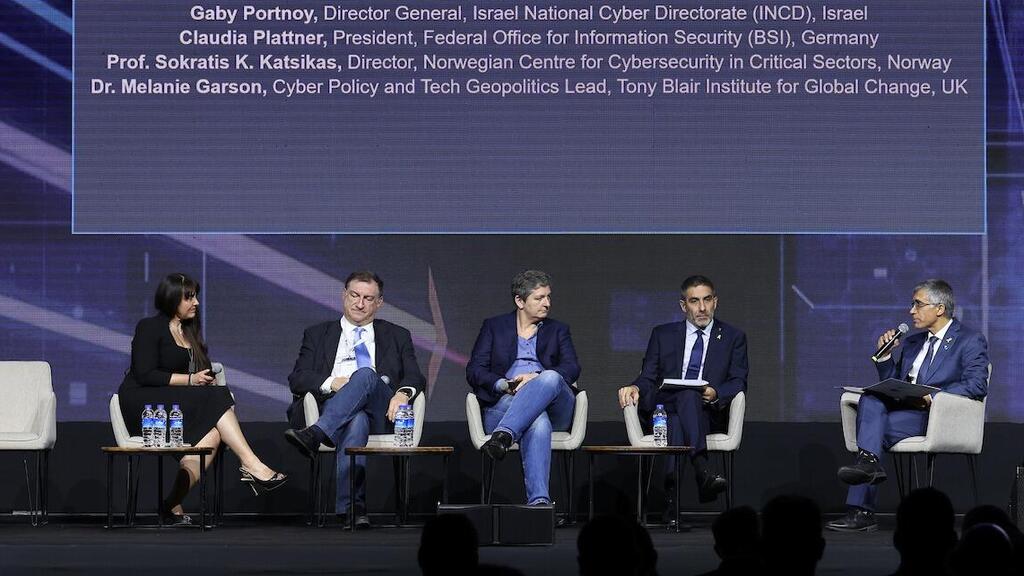
“There are no borders in cyberspace. We have to fight global terrorism together.”
In 2024, cyberattacks threaten our infrastructures and institutions during wartime and election seasons. It’s time for global cooperation and a shared language in cyberspace, says Gaby Portnoy, Director General at Israel National Cyber Directorate.
Director General at Israel National Cyber Directorate (INCD) Gaby Portnoy has urged countries to collaborate on protections against global terrorism amid Israel’s ongoing war with Hamas and the recent flare-up with Iran. Speaking on a panel promoting international dialogue on cyber challenges for 2024, he urged governments and institutions to trust one another.
“We face so many challenges. Think of juggling - but it's not three balls, it's 17,” he said. “It's about people, enemies, technology, processes, regulation, media management, public opinion, and more. There are no borders in cyberspace, and we have to fight global terrorism together. Today it's Israel, tomorrow it can be anywhere else.”
1 View gallery


(R-L) Melanie Garson, Sokratis Katsikas, Clausia Plattner, Gaby Portnoy, and Avinoam Atzaba
(Photo: CyberTech )
Portnoy made the remarks at CyberTech Global Tel Aviv, a conference connecting the cyber industry through conferences, events, and networking opportunities. This month saw global and Israeli companies come together from more than 60 countries to discuss the latest technological innovations, challenges, and solutions in the cyber arena.
CyberTech 2024 occurred during one of the most democratic years in history, with 50 countries expected to host elections and impacting almost 4 billion people. It also came during Israel’s ongoing war with Hamas and at the time when Iran was threatening to attack Israel’s soil for the first time. The country would eventually fire 300 aerial threats which were thwarted with 99% accuracy with the help of Israel’s Iron Dome and allies in the region.
Portnoy shared the stage with Claudia Plattner, President of the Federal Office for Information Security in Germany; Professor Sokratis Katsikas, Director of the Norwegian Center for Cybersecurity in Critical Sectors; and Dr. Melanie Garson, Cyber Policy and Tech Geopolitics Lead at the Tony Blair Institute for Global Change in the UK. Together they appeared on a panel moderated by INCD’s Executive Director for International Cooperation Abviram Atzaba where they discussed how to form an international dialogue for cyber challenges this year and beyond.
“Everybody has forgotten that we are fighting for our home,” Portnoy continued. “Iran is attacking, trying to harm the business continuity. So in cyber, we need a common language with other countries. We almost need the same regulation as we had with transportation, aviation, or maritime laws. And I think if we talk the same cyber language, we will have a better, secure world.”
Country priorities for cyber protection will vary based on size, culture, external threats, and capabilities. For Israel, cyber protections may come in the form of attack prevention on infrastructure or digital supply chain attacks. However, European or North American countries may look at misinformation or ransomware as ways that impact their societies from enemies such as Russia or China.
“We're all facing very much the same challenges, just in different labors and different priorities in our respective countries,” said Germany’s Plattner. “So for us, ransomware is the most urgent threat we're looking at right now: It's also disinformation and influence campaigns because elections are coming up all over the place, not least the European elections this summer. It's everything around espionage and information extraction that I'm really worried about because that's the thing you cannot really see.”
Norway’s Professor Katsikas agreed that misinformation poses a threat to countries around the world, citing a report for 2030 from the European Network for Information Security Agency (ENISA). “The top expected threat in the coming years is disinformation, particularly through the use of AI,” he confirmed, calling for what he described as ‘a quadruple helix system for innovation’. “You need together to have government, the industry of the businesses, academia, research, and society. This is actually one way of manifesting the total defense principle that several countries, including Norway and Israel, have as a national defense policy.”
The United Kingdom is expected to host an election this year for the first time since 2019, and Dr. Garson questioned whether or not the country was ready to handle potential attacks on its critical infrastructure and that solutions are in the interest of all political parties to ensure the continuation of healthy democratic dialogue. “Are we cyber resilient enough as a society, technically and structurally, to adapt to that? They're cross-partisan challenges that need to be addressed.”
This week saw countries come to Israel’s aid when Iran struck the country - the UK, the USA, Jordan, and Saudi Arabia each helped with blocking aerial threats such as drones, ballistic missiles, and cruise missiles from causing catastrophic damage. Cyber threats have also increased globally, seeing a rise in ransomware threats on companies and institutions as well as instilling misinformation into online discourse. The underlying message of the day was that these challenges must be met together to ensure they are prevented.













